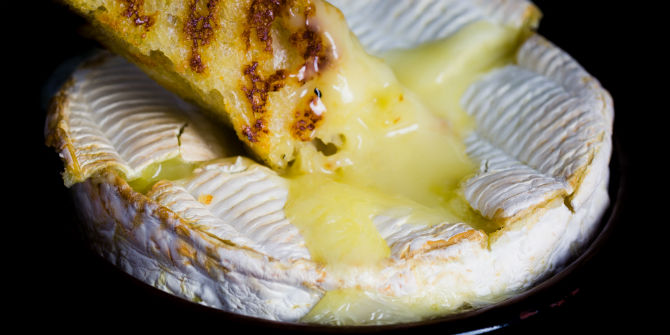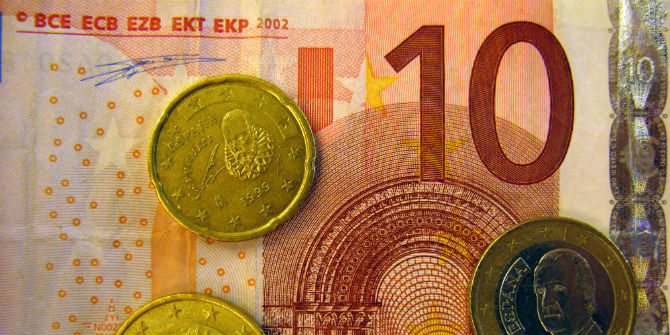
 Britain imports a lot of dairy produce, nearly all of it from the EU. At home, the industry employs a large number of workers from the rest of the EU. Jan Bakker and Nikhil Datta (LSE) predict that dairy will become more expensive after Brexit. Even if Britons switch to UK-produced dairy, it will take some years for domestic herds to meet demand.
Britain imports a lot of dairy produce, nearly all of it from the EU. At home, the industry employs a large number of workers from the rest of the EU. Jan Bakker and Nikhil Datta (LSE) predict that dairy will become more expensive after Brexit. Even if Britons switch to UK-produced dairy, it will take some years for domestic herds to meet demand.
While there still is large uncertainty about the new trading regime between the EU and the UK, businesses on both sides of the channel are trying to prepare for the new trading environment and the wider implications of the government’s Brexit policy. The extent to which different industries are affected by these policy changes varies widely, depending on the intensity with which they are trading with the EU and how much they will be affected by rising trade costs such as regulatory divergence.

In a recent report for LSE Consulting, we study the effect of Brexit on the UK dairy industry along three key dimensions: increasing trade costs, changes in the labour market and changes in final demand.
The UK relies heavily on imports to satisfy consumer demand for dairy products. It has a net dairy trade deficit of more than £1.5 billion, the second largest in the world (China has the biggest). Additionally, 98% of the UK’s dairy imports come from the EU. Thus, any changes in trade costs between the UK and EU will have important effects on the UK consumer as the price of imported goods will increase.
Brexit will invariably result in an increase in trade costs for UK-EU trade; however, there is significant uncertainty surrounding the size of this rise. Studies attempting to project the economic impact of Brexit often assume trade cost increases to be constant across sectors. We take a closer look at different components of post-Brexit trade costs which are likely to be specifically important for the dairy industry, such as customs declarations, rules of origin costs (RoO), animal and food-specific regulations, and imposed check times and port traffic.
Assuming the UK does not have a customs agreement with the EU once it leaves, UK-EU trade will require customs declarations, as is required for UK trade with the rest of the world. Customs declarations are usually made by companies using either an internal digital system or through logistics providers. Fees by providers can go beyond £25 per sea container and this provides a useful benchmark for the involved administrative cost. The ability to easily create customs declarations will rely on the smooth functioning of the Customs Declaration Service (CDS). This new system was designed prior to the Brexit vote and as it stands will only be capable of handling up to 150 million custom declarations a year once active, much less than the 250 million declarations a year the HMRC estimates post-Brexit. Expecting the CDS to run at over 160% capacity could lead to an unstable system which may result in additional waiting times. This compounded with the fact that approximately 130,000 new traders will be required to fill out declarations for the first time, make the prospect of a lack of customs arrangement a concern.
As long as the UK is a member of the European Union, goods can move seamlessly through UK ports, going to or coming from the EU. Outside of the Customs Union this will no longer be the case and customs inspection will take place, which will add to waiting times at border points. Recent research from Imperial College London has estimated the impact of vehicle checks onto the peak-time traffic queue. Using their results, we calculate that an extra seven minutes of check times per vehicle at Dover would imply at least £111 per container increase in transportation labour costs alone at the current wage rate. When one considers the loss of perishable goods, lorry maintenance and general equilibrium effects (all importers and exporters will require more HGV driver time, pushing up wages) this will likely increase. Currently the average check time at the border for goods traded with non-EU countries stands at 20 minutes.
Without a customs arrangement, the dairy sector will be particularly affected by potential border checks as its products are classified as products of animal origin (POAO) which undergo additional controls at border checkpoints. For example, veterinary control checks incur costs of £50.60 per 6 tonne consignment and an additional cost of £45 per consignment for organic certification. The British Veterinary Association has estimated that there will be a 325% increase in the demand for vet checks at the border and importantly, almost half of the newly registered vets in 2016 were non-UK EU graduates. The latter of these two issues points to some first signs of exposure of the dairy industry to migration restrictions. These two forces, increasing labour demand and reducing supply, will invariably result in either increased vet check prices, or, as all POAO shipment must go through these checks, longer waiting times at the border.
Overall, any trade regime that does not involve truly frictionless trade, such as a customs union, is likely to result in increasing prices for dairy products in the short-run. In the long run, these price increases might lead to an expansion of the local dairy industry. However, the time lag is likely to be significant as increasing the size of livestock herds through reproduction can take a number of years. Furthermore, it will involve risky investment on behalf of farmers who face great uncertainty about what the relationship with the EU will be following Brexit day. The expansion of the local dairy industry will also not be able to make up for the loss of variety that makes up a crucial part of the gains from trade. The dairy industry serves as a perfect example for this, as there are certain varieties that must be imported and cannot be produced domestically, such as Danish blue cheese or French brie.
As hinted at above, Brexit will also affect the UK dairy industry through its impact on the labour market. Currently migrants from the EU, and especially the new member states, are an important part of the workforce in the agricultural industry. This is especially the case in food and drink manufacturing where 30% of the workforce are originally from the EU, compared to 6% of overall employment. Despite this reliance on migration, we find that on average the dairy sector is unlikely to experience upward wage pressure in the aggregate. The upward wage pressure from reduced migration is likely to be outweighed by reductions in labour demand due to reduced growth in economic activity due to Brexit, as projected by the Centre for Economic Performance, the National Institute for Economic Research and others.
Nevertheless, more than one third of businesses in the food and drink industry indicated that their business would become unviable if they lost access to (non-UK) EU nationals, indicating that there is likely to be upward pressure on wages and labour shortages for certain occupations. As well as vets, we find HGV drivers is an important exposed occupation for the dairy industry. Labour force data suggests HGV drivers already experienced a rise in nominal wages of around 10% since the referendum. This is in line with reports from industry insiders indicating difficulties in hiring lorry drivers as the sterling depreciation reduced European driver’s real wages in their home currency.
Overall, we find that in the absence of frictionless trade and appropriate government policy to address skill shortages, Brexit is likely to have a negative effect on consumers through higher prices for dairy products. This pinch will be exacerbated by the fact that Brexit-related inflationary pressures and uncertainty have already cost the average household approximately £1,270 – and projections suggest that post-Brexit, increasing trade costs could result in further losses.
This post represents the views of the authors and not those of the Brexit blog, nor the LSE.
Jan Bakker is a DPhil student at the University of Oxford and a research assistant at the LSE Centre for Economic Performance. His research spans international trade, economic geography and labour economics.
Nikhil Datta is a PhD candidate at University College London and a research assistant at the CEP. His research interests include labour economics and international trade.







Scaremongery at best.
I don’t see any reference to the French in this matter.
The big losers will be the French, and they don’t intend to allow that to happen.
Again the worst that can happen is a small levy. It isn’t life threatening!!!
Why does no one recognise the vast amounts of income to uk from levies that will be applied to counter unreasonable behaviour.
We can use that money ( amongst other things) to subsidies entrepreneurs.
https://www.google.co.uk/amp/s/www.express.co.uk/news/politics/997628/brexit-news-theresa-may-trade-WTO-eu-no-deal-Brexit/amp
GB is a very important customer to French dairy product and many businesses in france would fold if there were no deal.
If there were no deal, If there were no deal!!!!
But if there were a no deal this article completely underestimates the ability of the British entrepreneur to fill a gap.
England’s green and plentiful land!!!
Instead of uk supermarkets driving farmers into the ground and demanding stupidly low prices our farmers will step up to the plate to supply demand.
Creating uk jobs, factories, processing and delivering. Not by climate destroying long distance juggernaughts but by local product as does happen in Yorkshire dales and elsewhere.
As this article spells out lorry drivers are being paid better, what’s wrong with that.
What’s wrong with everyone being paid better in order to stimulate a fantastic economy.
That way we will all be able to afford a small increase in cheese.etc etc etc.
Bring it on!!!
“The dairy industry serves as a perfect example for this, as there are certain varieties that must be imported and cannot be produced domestically, such as Danish blue cheese or French brie.”
Are you having a laugh? Of course cheese that is specifically made in another country cannot be made in Britain. But we make Brie and blue cheese in Britain, you know…
Anyway, Brexit is an existential choice about whether we should be EU members. And all ‘the intelligentsia’ can bang on about is the price of cheese.
This article seems to completely ignore the fact that current agricultural imports are subject to high tariff and non tariff barriers on entry to the EU. Cheese and other agricultural products may be imported from non EU sources and the UK is free to set its own tariffs. Were the UK to halve these rates it would reduce basic food prices with expensive EU producers unable to compete.
There are many real issues around brexit and for trade the barriers to services are a genuine issue. Consumer food prices are likely to be a big beneficiary of brexit and any analysis that ignores the potential for importers to move to non EU suppliers is to say the least surprising.